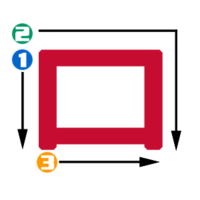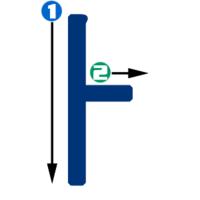Difference between revisions of "Hangeul step 2"
m (→Introduction: Revised some capitalization and did some slight rewording) |
DigitalSoju (Talk | contribs) (→Real Examples: temp save) |
||
| Line 175: | Line 175: | ||
==Real Examples== | ==Real Examples== | ||
| + | ==More Examples== | ||
{| class="wikitable" style="text-align:center; margin-left: auto; margin-right: auto;" | {| class="wikitable" style="text-align:center; margin-left: auto; margin-right: auto;" | ||
|- | |- | ||
! Word !! Audio | ! Word !! Audio | ||
|- | |- | ||
| − | | | + | | 가깝다 (to be close) |
| − | | <flashmp3> | + | | <flashmp3>gaggapda J.mp3, gaggapda C.mp3|leftbg=003478|rightbg=c60c30|lefticon=ffffff|loop=yes|righticon=ffffff|loop=yes</flashmp3> |
|- | |- | ||
| − | | | + | | 과외 (private lesson) |
| − | | <flashmp3> | + | | <flashmp3>Gwaoe j.mp3.mp3, Gwaoe c.mp3.mp3|leftbg=003478|rightbg=c60c30|lefticon=ffffff|loop=yes|righticon=ffffff|loop=yes</flashmp3> |
|- | |- | ||
| − | | | + | | 가위 (scissors) |
| − | | <flashmp3> | + | | <flashmp3>gawi J.mp3, gawi C.mp3|leftbg=003478|rightbg=c60c30|lefticon=ffffff|loop=yes|righticon=ffffff|loop=yes</flashmp3> |
|- | |- | ||
| − | | | + | | 과일 (fruit) |
| − | | <flashmp3> | + | | <flashmp3>gwail J.mp3, gwail C.mp3|leftbg=003478|rightbg=c60c30|lefticon=ffffff|loop=yes|righticon=ffffff|loop=yes</flashmp3> |
|- | |- | ||
| − | | | + | | 과자 (snack) |
| − | | <flashmp3> | + | | <flashmp3>gwaja J.mp3, gwaja C.mp3|leftbg=003478|rightbg=c60c30|lefticon=ffffff|loop=yes|righticon=ffffff|loop=yes</flashmp3> |
|- | |- | ||
| − | | | + | | 기쁘다 (to be glad) |
| − | | <flashmp3> | + | | <flashmp3>gibbeuda J.mp3, gibbeuda C.mp3|leftbg=003478|rightbg=c60c30|lefticon=ffffff|loop=yes|righticon=ffffff|loop=yes</flashmp3> |
|- | |- | ||
| − | | | + | | 깍두기 (cubed radish kimchi) |
| − | | <flashmp3> | + | | <flashmp3>kkakdugi J.mp3, kkakdugi C.mp3|leftbg=003478|rightbg=c60c30|lefticon=ffffff|loop=yes|righticon=ffffff|loop=yes</flashmp3> |
|- | |- | ||
| − | | | + | | 꽃 (flower) |
| − | | <flashmp3> | + | |<flashmp3>kkot J.mp3, kkot C.mp3|leftbg=003478|rightbg=c60c30|lefticon=ffffff|loop=yes|righticon=ffffff|loop=yes</flashmp3> |
|- | |- | ||
| − | | | + | | 뜨겁다 (to be hot [touch]) |
| − | | <flashmp3> | + | | <flashmp3>tteugeopda J.mp3, tteugeopda C.mp3|leftbg=003478|rightbg=c60c30|lefticon=ffffff|loop=yes|righticon=ffffff|loop=yes</flashmp3> |
|- | |- | ||
| − | | | + | | 법원 (court of law) |
| − | | <flashmp3> | + | | <flashmp3>beobwon J.mp3, beobwon C.mp3|leftbg=003478|rightbg=c60c30|lefticon=ffffff|loop=yes|righticon=ffffff|loop=yes</flashmp3> |
|- | |- | ||
| − | | | + | | 비싸다 (to be expensive) |
| − | | <flashmp3> | + | | <flashmp3>bissada J.mp3, bissada C.mp3|leftbg=003478|rightbg=c60c30|lefticon=ffffff|loop=yes|righticon=ffffff|loop=yes</flashmp3> |
|- | |- | ||
| − | | | + | | 빠르다 (to be quick) |
| − | | <flashmp3> | + | | <flashmp3>pparuda J.mp3, pparuda C.mp3|leftbg=003478|rightbg=c60c30|lefticon=ffffff|loop=yes|righticon=ffffff|loop=yes</flashmp3> |
|- | |- | ||
| − | | | + | |스웨덴 (Sweden) |
| − | | <flashmp3> | + | | <flashmp3>seuwedeon c.mp3, seuwedeon j.mp3|leftbg=003478|rightbg=c60c30|lefticon=ffffff|loop=yes|righticon=ffffff|loop=yes</flashmp3> |
|- | |- | ||
| − | | | + | | 싸구려 (cheap goods) |
| − | | <flashmp3> | + | | <flashmp3>ssaguryeo J.mp3, ssaguryeo C.mp3|leftbg=003478|rightbg=c60c30|lefticon=ffffff|loop=yes|righticon=ffffff|loop=yes</flashmp3> |
|- | |- | ||
| − | | | + | | 싸다 (to be cheap) |
| − | | <flashmp3> | + | | <flashmp3>ssada J.mp3, ssada C.mp3|leftbg=003478|rightbg=c60c30|lefticon=ffffff|loop=yes|righticon=ffffff|loop=yes</flashmp3> |
|- | |- | ||
| − | | | + | | 싸우다 (to fight) |
| − | | <flashmp3> | + | | <flashmp3>ssauda J.mp3, ssauda C.mp3|leftbg=003478|rightbg=c60c30|lefticon=ffffff|loop=yes|righticon=ffffff|loop=yes</flashmp3> |
|- | |- | ||
| − | | | + | | 쓰다 (to use, to write) |
| − | | <flashmp3> | + | | <flashmp3>sseuda J.mp3, sseuda C.mp3|leftbg=003478|rightbg=c60c30|lefticon=ffffff|loop=yes|righticon=ffffff|loop=yes</flashmp3> |
|- | |- | ||
| − | | | + | | 어렵다 (to be difficult) |
| − | | <flashmp3> | + | | <flashmp3>eoryeopda J.mp3, eoryeopda C.mp3|leftbg=003478|rightbg=c60c30|lefticon=ffffff|loop=yes|righticon=ffffff|loop=yes</flashmp3> |
|- | |- | ||
| − | | | + | | 예쁘다 (to be pretty) |
| − | | <flashmp3> | + | | <flashmp3>yeppuda J.mp3, yeppuda C.mp3|leftbg=003478|rightbg=c60c30|lefticon=ffffff|loop=yes|righticon=ffffff|loop=yes</flashmp3> |
|- | |- | ||
| − | | | + | |왕 (king) |
| − | | <flashmp3> | + | |<flashmp3>Wang J.mp3, Wang C.mp3|leftbg=003478|rightbg=c60c30|lefticon=ffffff|loop=yes|righticon=ffffff|loop=yes</flashmp3> |
|- | |- | ||
| − | | | + | | 왜 (why) |
| − | | <flashmp3> | + | | <flashmp3>wae J.mp3, wae C.mp3|leftbg=003478|rightbg=c60c30|lefticon=ffffff|loop=yes|righticon=ffffff|loop=yes</flashmp3> |
|- | |- | ||
| − | | | + | | 외국 (foreign country) |
| − | | <flashmp3> | + | | <flashmp3>oegug J.mp3, oegug C.mp3|leftbg=003478|rightbg=c60c30|lefticon=ffffff|loop=yes|righticon=ffffff|loop=yes</flashmp3> |
|- | |- | ||
| − | | | + | | 외숙모 (mom's brother's wife) |
| − | | <flashmp3> | + | | <flashmp3>oesukmo J.mp3, oesukmo C.mp3|leftbg=003478|rightbg=c60c30|lefticon=ffffff|loop=yes|righticon=ffffff|loop=yes</flashmp3> |
|- | |- | ||
| − | | | + | | 원 (The won, Korean currency) |
| − | | <flashmp3> | + | | <flashmp3>won J.mp3, won C.mp3|leftbg=003478|rightbg=c60c30|lefticon=ffffff|loop=yes|righticon=ffffff|loop=yes</flashmp3> |
|- | |- | ||
| − | | | + | | 웬일 (what reason) |
| − | | <flashmp3> | + | | <flashmp3>woenil J.mp3, woenil C.mp3|leftbg=003478|rightbg=c60c30|lefticon=ffffff|loop=yes|righticon=ffffff|loop=yes</flashmp3> |
|- | |- | ||
| − | | | + | | 위험하다 (to be dangerous) |
| − | | <flashmp3> | + | | <flashmp3>wuiheomhada J.mp3, wuiheomhada C.mp3|leftbg=003478|rightbg=c60c30|lefticon=ffffff|loop=yes|righticon=ffffff|loop=yes</flashmp3> |
|- | |- | ||
| − | | | + | | 의료 보험 (medical insurance) |
| − | | <flashmp3> | + | | <flashmp3>uiryoboheom J.mp3, uiryoboheom C.mp3|leftbg=003478|rightbg=c60c30|lefticon=ffffff|loop=yes|righticon=ffffff|loop=yes</flashmp3> |
|- | |- | ||
| − | | | + | | 의사 (doctor) |
| − | | <flashmp3> | + | | <flashmp3>uisa J.mp3, uisa C.mp3|leftbg=003478|rightbg=c60c30|lefticon=ffffff|loop=yes|righticon=ffffff|loop=yes</flashmp3> |
|- | |- | ||
| − | | | + | | 의자 (chair) |
| − | | <flashmp3> | + | | <flashmp3>uija J.mp3, uija C.mp3|leftbg=003478|rightbg=c60c30|lefticon=ffffff|loop=yes|righticon=ffffff|loop=yes</flashmp3> |
|- | |- | ||
| − | | | + | | 치과 (denist office) |
| − | | <flashmp3> | + | | <flashmp3>chigwa J.mp3, chigwa C.mp3|leftbg=003478|rightbg=c60c30|lefticon=ffffff|loop=yes|righticon=ffffff|loop=yes</flashmp3> |
|- | |- | ||
| − | | | + | | 취하다 (to get drunk) |
| − | | <flashmp3> | + | | <flashmp3>chwuihada J.mp3, chwuihada C.mp3|leftbg=003478|rightbg=c60c30|lefticon=ffffff|loop=yes|righticon=ffffff|loop=yes</flashmp3> |
| + | |- | ||
| + | | 회사 (company) | ||
| + | | <flashmp3>hoesa J.mp3, hoesa C.mp3|leftbg=003478|rightbg=c60c30|lefticon=ffffff|loop=yes|righticon=ffffff|loop=yes</flashmp3> | ||
| + | |- | ||
| + | | 원숭이 (monkey) | ||
| + | | <flashmp3>wonsungi J.mp3, wonsungi C.mp3|leftbg=003478|rightbg=c60c30|lefticon=ffffff|loop=yes|righticon=ffffff|loop=yes</flashmp3> | ||
|} | |} | ||
Revision as of 03:48, 23 March 2010
|
|
|
| Help · Cheat Sheet · Community portal |

|

|
Contents
Introduction
Since consonants cannot be pronounced without the help of a vowel, we have decided to teach you the vowel first, then proceed to pair it with a consonant. Note some of these files are set to loop, so you must manually stop the files yourself.
In this lesson, you will learn:
|
| ||||||||||
|
For full information about this letter, see ㅏ.
|
This is pronounced like a mix between a G and a K at the beginning of a word. However, when found between vowels, the sound is voiced and makes a /g/ sound. For full information about this letter, see ㄱ. | ||||||||||
| Practice | |
|---|---|
| 가 | |
|
| ||||||||||
|
This sound makes an "ooh" sound, similar to 'moon' or 'blue' or the U sound in Spanish (i.e. usted in "usted"). For full information about this letter, see ㅜ.
|
This sound is the same as the N sound in English. For full information about this letter, see ㄴ. | ||||||||||
| Practice | |
|---|---|
| 누 | |
| 나 | |
| 구 | |
|
| ||||||||||
|
For full information about this letter, see ㅗ.
|
This sound is the same as the M sound in English. For full information about this letter, see ㅁ. | ||||||||||
| Practice | |
|---|---|
| 모 | |
| 마 | |
| 무 | |
| 고 | |
| 노 | |
|
| ||||||||||
|
This sound is similar to the 'ee' sound in 'see' or 'free.' For full information about this letter, see ㅣ.
|
This is pronounced like a mix between the sounds of a T and a D at the beginning of a word. However, when found between vowels, the sound is voiced and makes a /d/ sound. For full information about this letter, see ㄷ. | ||||||||||
| Practice | |
|---|---|
| 디 | |
| 다 | |
| 두 | |
| 도 | |
| 기 | |
| 니 | |
| 미 | |
| ||||
|
ㅇ represents no sound when found in the initial position of a syllable. Instead, it simply acts as a placeholder since vowels cannot be written by themselves. However, if ㅇ is in the final (bottom) position, it makes an "ng" sound, i.e. 'sing' or 'wrong' (IPA: ŋ ), but these final position sounds will not be discussed until step 5 of this lesson. For now, think of it as a placeholder for a consonant when only a vowel sound must be written. For full information about this letter, see ㅇ. | ||||
| Practice | |
|---|---|
| 아 | |
| 우 | |
| 오 | |
| 이 | |
Real Examples
More Examples
| Word | Audio |
|---|---|
| 가깝다 (to be close) | |
| 과외 (private lesson) | Error: file |
| 가위 (scissors) | |
| 과일 (fruit) | |
| 과자 (snack) | |
| 기쁘다 (to be glad) | |
| 깍두기 (cubed radish kimchi) | |
| 꽃 (flower) | |
| 뜨겁다 (to be hot [touch]) | |
| 법원 (court of law) | |
| 비싸다 (to be expensive) | |
| 빠르다 (to be quick) | |
| 스웨덴 (Sweden) | |
| 싸구려 (cheap goods) | |
| 싸다 (to be cheap) | |
| 싸우다 (to fight) | |
| 쓰다 (to use, to write) | |
| 어렵다 (to be difficult) | |
| 예쁘다 (to be pretty) | |
| 왕 (king) | |
| 왜 (why) | |
| 외국 (foreign country) | |
| 외숙모 (mom's brother's wife) | |
| 원 (The won, Korean currency) | |
| 웬일 (what reason) | |
| 위험하다 (to be dangerous) | |
| 의료 보험 (medical insurance) | |
| 의사 (doctor) | |
| 의자 (chair) | |
| 치과 (denist office) | |
| 취하다 (to get drunk) | |
| 회사 (company) | |
| 원숭이 (monkey) |
Writing
Characters are written in a certain stroke order. Korean letters are written left to right, top to bottom.

|

|


















